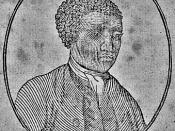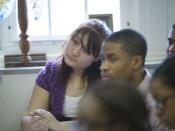Benjamin Banneker grew up as a free black man in colonial America. The Banneker family was slightly outcast from the Baltimore County community because of their mixed heritage. Solitude did not upset young Banneker because it gave him an opportunity to teach himself and learn about the nature surrounding him. The author, Charles Cerami, demonstrates how Banneker was a highly intelligent man who did not allow the negative views of society to hold him back from achieving greatness.
Benjamin Banneker was born November 9, 1731 in Baltimore County, Maryland to Robert and Mary Banneky. Robert was a free slave from Guinea. Mary was the daughter of Molly Welsh and Banneka (Cerami 4). Molly Welsh was an Englishwoman sent to the colonies as an indentured servant. After serving her time, she bought two slaves to help on her farm. Banneka was one of them and was freed by Molly before their marriage.
Historians believe that Banneka was a prince from the Dogon tribe in West Africa (5).
Banneker and his sisters were raised on their grandparents' tobacco farm while their parents worked to purchase their own plantation named Stout (28). As a young child Banneker loved learning, and his grandmother taught him to read using her family Bible. This piece of literature had a great influence on the style and dialect of Banneker's writings and can be seen in his almanacs and essays written during his life (16). When Banneker was about seven or eight years old, a Quaker schoolteacher named Peter Heinrich came to live in area and set up a school (17). Banneker was permitted to attend the school and learned how to write and do simple arithmetic. His love for math and learning grew. He was extremely studious. Schoolmates described Banneker as "never fond of play or light...


